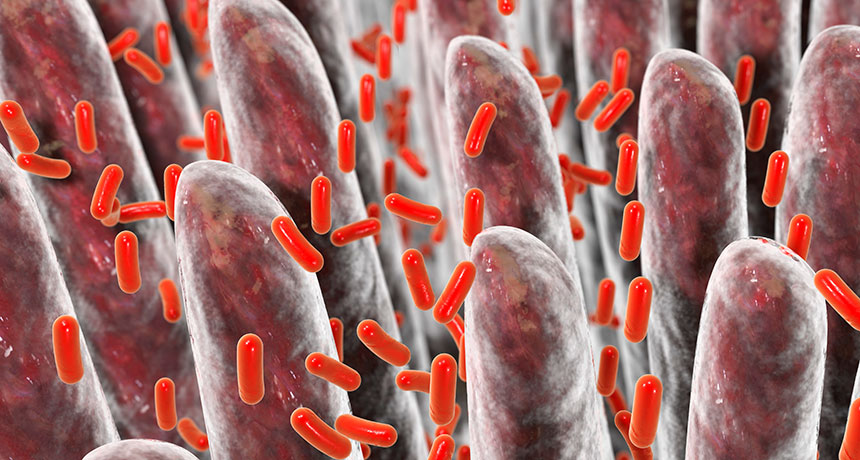
GUT REACTION Bacteria in people’s guts (illustrated) have the potential to interfere with many oral medications.
Dr_Microbe/iStock/Getty Images Plus
Prescribing the best medication may require going with a patient’s gut — or at least, the bacteria that live there.
Anecdotal reports have revealed that some gut-dwelling microbes chemically alter oral medications, affecting how well those drugs work (SN Online: 7/19/13). But the scope of this problem has remained unclear. Now, a sweeping survey of these interactions suggests that gut bacteria can modify many drugs and that the genetic makeup of a patient’s microbiota may predict that person’s response to medications, researchers report online June 3 in Nature.
“Knowing how the gut microbes … affect a drug is hugely useful,” says Matthew Redinbo, a biochemist at the University of North Carolina at Chapel Hill not involved in the work. An atlas of microbial effects on oral medications could help pharmaceutical companies develop more effective drugs and help doctors better tailor a patient’s treatment.
Researchers tested the ability of 76 types of bacteria — selected to represent the microbial diversity of the human gut — to alter the molecular structure of 271 oral drugs, from hormones to antiviral medications. The bacteria were incubated with nutrients and drug solutions in test tubes for 12 hours. In that time, 176, or about two-thirds, of the 271 drugs were modified by at least one bacterial strain, and each strain modified 11 to 95 different drugs.
“That is huge,” says Nichole Klatt, a microbiome researcher at the University of Miami not involved in the work. But knowing which microbes affect which drugs isn’t enough. Future studies could investigate exactly how bacteria chemically modify medications and the consequences inside the human body, she says.
Maria Zimmermann-Kogadeeva, a computational biologist at Yale University, and her colleagues did show that the collective genetic makeup of an individual’s gut microbiota may predict how that person will respond to a medication.
The team first developed a technique to identify which part of a bacterium’s DNA gives it the ability to modify a particular drug. This step involved chopping up DNA from a bacterium of interest and inserting individual snippets into E. coli cells. Monitoring which E. coli developed the ability to alter specific drugs exposed which DNA fragments were messing with those medications.
Then, in a series of experiments with different medications, the researchers monitored the drug-modifying abilities of the entire microbial population in fecal samples from 28 people. In each experiment, all the microbial communities were exposed to the same drug. Afterward, the researchers searched the microbes in each stool sample for the drug-altering DNA snippets identified in the E. coli test, as well as bits of DNA from other microbes that were at least 50 percent similar. Such similar DNA segments are thought to have similar functions.
The amount of these similar-looking pieces of DNA in each fecal sample aligned with how much that microbial population modified a certain drug, the team found. That suggests that genetically testing the population of bacteria in a patient’s poop could gauge how likely that person’s microbiota is to interfere with certain drugs.
Such insight may help clinicians choose medications, or decide whether to prescribe a treatment to make a person’s gut bacteria more amenable to a certain drug. “You cannot just change [a patient’s] liver because someone doesn’t metabolize a drug well,” says study coauthor Michael Zimmermann, a pharmaceutical scientist and systems biologist at Yale. But antibiotics or fecal transplants may be able to strategically manipulate a patient’s microbial population (SN Online: 5/18/18).
On the flip side, microbes’ ability to interfere with how the body processes drugs “actually can be beneficial,” Zimmermann-Kogadeeva says. Besides designing pills to avoid certain bad reactions with bacteria, pharmaceutical companies could also develop medications that exploit microbial modifications to enhance or prolong a drug’s effect, she says.







